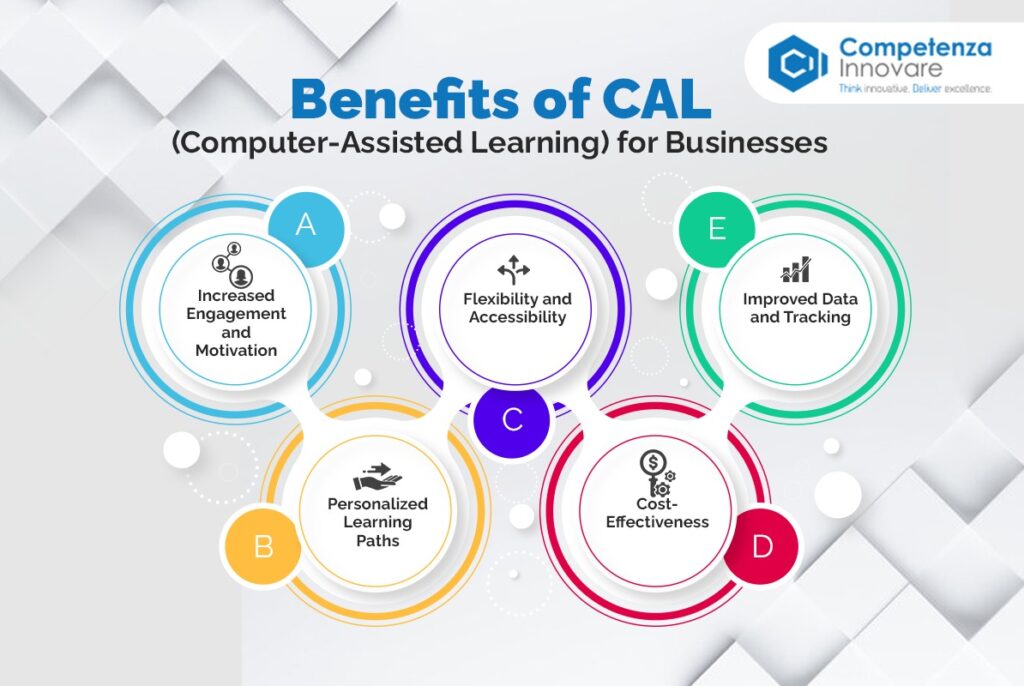Did you know that according to a recent study by Deloite, companies with strong training programs see a 218% higher revenue per employee compared to those without?
What is CAL (Computer-Assisted Learning)?
In today’s rapidly evolving business landscape, effective employee training is no longer a luxury, it’s a necessity. This is where Computer-Assisted Learning (CAL) comes in. CAL leverages technology to create interactive and engaging learning experiences that can significantly enhance your training programs.
By incorporating CAL into your training strategy, you can empower your employees with the knowledge and skills they need to succeed, ultimately leading to a more productive, efficient, and profitable business.
Benefits of CAL (Computer-Assisted Learning) for Businesses

A. Increased Engagement and Motivation
Gone are the days of dry lectures and monotonous handouts. CAL injects excitement into learning with:
- Multimedia Elements: Imagine employees learning through interactive simulations, engaging videos, and captivating animations. CAL breaks down complex topics into digestible chunks, fostering a deeper understanding.
- Gamification: Turn learning into a game! CAL can incorporate points, badges, and leaderboards to create a healthy competitive spirit. This not only boosts motivation but also encourages employees to complete training modules.
B. Personalized Learning Paths
CAL isn’t a one-size-fits-all approach. It caters to individual needs by:
- Adapting to Learning Styles: Some learn best visually, while others prefer hands-on activities. CAL can adjust the training content and delivery based on individual preferences, leading to better information retention.
- Self-Paced Learning: Busy schedules? No problem! CAL allows employees to learn at their own pace, revisit specific modules for reinforcement, and master skills before moving on. This personalized approach fosters a deeper understanding and skill development.
C. Flexibility and Accessibility
The beauty of CAL lies in its:
- Anytime, Anywhere Learning: No more being tied to a specific location or time. With CAL, employees can access training materials and complete modules on their own schedule, from the office, home, or even while traveling.
- Remote Workforce Friendly: For businesses with geographically dispersed teams, CAL eliminates geographical barriers. Employees can access the same high-quality training regardless of location.
D. Cost-Effectiveness
CAL offers significant cost savings by:
- Reducing Training Costs: Say goodbye to expensive instructor fees, venue rentals, and physical training materials. CAL provides a more scalable and cost-effective way to deliver training to a large audience.
- Investing in a Skilled Workforce: A well-trained workforce is a productive one. CAL helps bridge skill gaps, leading to fewer errors, increased efficiency, and ultimately, higher profitability.
E. Improved Data and Tracking
CAL goes beyond simply delivering content. It provides valuable insights by:
- Detailed Progress Tracking: Track employee progress through each module, identify areas where they excel and areas needing improvement.
- Data-Driven Training: With this data, you can tailor future training programs to address specific knowledge gaps and ensure employees are getting the most out of their learning experience.
Implementing CAL: Partnering for Success
Successfully integrating CAL into your training strategy requires careful planning and expertise. IT service providers can be valuable partners in this process. These providers possess the knowledge and resources to help you navigate the various aspects of CAL implementation.
Here are some key services IT service providers can offer:
- Needs Assessment and Platform Selection: They can work with you to understand your specific training goals and recommend the most suitable CAL platform that aligns with your budget, technical infrastructure, and learning objectives.
- Content Development and Customization: If you lack in-house training materials, they can assist in developing engaging and informative CAL content tailored to your unique needs. Additionally, they can customize existing content to ensure a seamless fit with your company culture.
- Technical Support and Integration: Their IT specialists can ensure smooth integration of your chosen CAL platform with your existing systems. They can also provide ongoing technical support to address any issues and ensure a seamless learning experience for your employees.
- Data Analysis and Reporting: IT service providers can help you extract valuable insights from the data generated by your CAL program. They can assist with analyzing employee progress, identifying areas for improvement, and generating reports to track the effectiveness of your training programs.
By partnering with an experienced IT service provider, you can leverage their expertise to overcome implementation challenges and ensure your CAL program delivers on its full potential.
Conclusion
In today’s rapidly evolving business landscape, effective employee training is no longer a luxury, it’s a necessity. Computer-Assisted Learning (CAL) offers a powerful solution by transforming traditional training methods into engaging, interactive, and data-driven experiences.
Key benefits of CAL for businesses include:
- Increased Engagement and Motivation: CAL keeps employees engaged through multimedia elements and gamification techniques, leading to better knowledge retention.
- Personalized Learning Paths: CAL caters to individual learning styles and paces, ensuring a deeper understanding of complex topics.
- Flexibility and Accessibility: Employees can access training materials and complete modules on their own schedule, from any location.
- Cost-Effectiveness: CAL reduces training costs associated with instructors, materials, and venue rentals. Additionally, a well-trained workforce leads to increased efficiency and profitability.
- Improved Data and Tracking: CAL provides valuable insights into employee progress, allowing you to tailor training programs for better outcomes..
By embracing CAL (Computer-Assisted Learning), you can empower your employees with the knowledge and skills they need to thrive in today’s competitive business environment.






